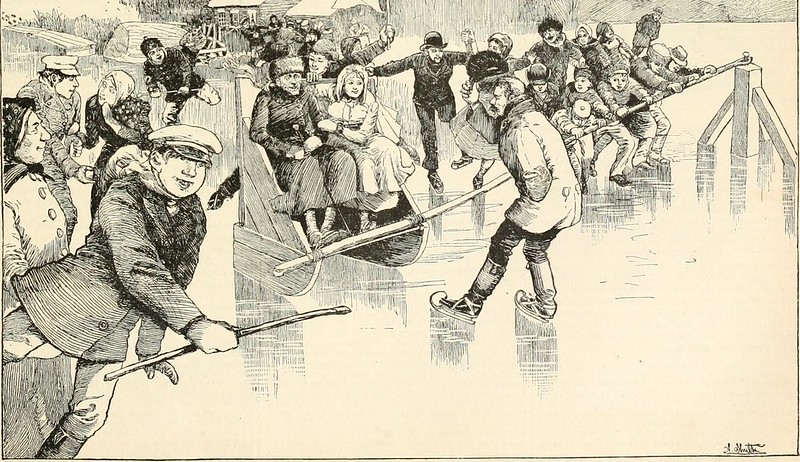Note: This article has been excerpted from a larger work in the public domain and shared here due to its historical value. It may contain outdated ideas and language that do not reflect TOTA’s opinions and beliefs.
From When I Was a Boy in Norway, by John Oscar Hall, 1921.
Our Games and Play
We had a splendid time as children, because Norway is the "Playground of the North," All the summer was spent out in the open air, either herding sheep or goats in the mountains or looking after ponies and cows closer to our home. We also had a good time rowing and fishing.
But the winter sport of skiing, skating, and tobogganing is by far the most exhilarating and enjoyable form of play.
The children in Norway have games very much the same as children in other countries. Of course the girls have dolls and dolls' houses and dolls' tea-parties, like the girls of every land, and there are toys of every description in the shops.
The peasant children have to provide their own playthings, and it is wonderful what an amount of amusement they can get out of cows made from bones, and ships made out of bark. The real enjoyment is to be found, however, in outdoor games, and we had scores and scores of different ones. Many of these games are regular Folk Dances where singing and the "Ring Dance” form an important part. As the name "Ring Dance" implies, the players join hands and dance round in a circle.
Several games seem to be common in most countries; — "Blind Man's Buff," "Hunt the Slipper" and "Forfeits" are found nearly everywhere. Here is the Norse version of "Round and Round the Mulberry Bush," which in some parts is called "Round the Juniper Bush":
“So we go round the juniper bush, the juniper bush, the juniper bush,
So we go round the juniper bush early on Monday morning.
This is the way we wash our clothes, wash our clothes, wash our clothes,
This is the way we wash our clothes early on Monday morning.''So we go round the juniper bush, the juniper bush, the juniper bush.
So we go round the juniper bush early on Tuesday morning.
This is the way we wring out our clothes, wring out our clothes, wring out our clothes,
This is the way we wring out our clothes early on Tuesday morning.''
The washing operations proceed through the next three days of the week, with a verse to each day. Thus on Wednesday they hang up the clothes, on Thursday they mangle them, and on Friday iron them. Then on Saturday they scrub the floor, and on Sunday go to church.
With each verse the children dance hand in hand round the imaginary juniper bush, singing lustily, and illustrating the different actions of the washing operations. Finally, two and two and arm in arm, they promenade around, as if going to church, and generally prolong the walk while they sing the last verse a second time.
The Norwegian children are also fond of playing mock weddings in which the bride wears a crown and they all go in procession to the church where the minister performs the ceremony. Some of the games peculiar to the children in Norway are: "Fire Patrol;" "Weaving of Homespun;" "Last Couple Out;'' "The Third Man in the Wind," etc.
Every one is familiar with the game "London Bridge is Falling Down” yet probably few are aware that the words are translated from an old Norse song, and fewer still could tell who broke down the bridge. The story goes that this was accomplished by King Olaf, afterwards known as St. Olaf. He and his Vikings had allied themselves with Ethelred the Unready of England against the Danes, who held the Thames above London Bridge. The bridge itself, which in those days was a rough wooden structure, was densely packed with armed men, prepared to resist the advance of the combined fleets. But Olaf drove his stout ships against it, made them fast to the piers, hoisted all his sails, got out his oars and thus succeeded in upsetting the bridge into the river, thereby securing victory for Ethelred. This took place in Olaf's younger days, while he was yet a Viking, and before he had gained the throne of Norway,
Hall, John Oscar. When I was a Boy in Norway. Lee & Shepard Co., 1921.
About TOTA
TOTA.world provides cultural information and sharing across the world to help you explore your Family’s Cultural History and create deep connections with the lives and cultures of your ancestors.


